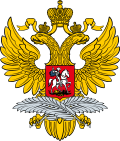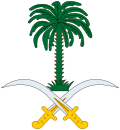| Ambassador of the Russian Federation to the Kingdom of Saudi Arabia | |
|---|---|
| سفير الاتحاد الروسي لدى المملكة العربية السعودية | |
 Emblem of the Ministry of Foreign Affairs of Russia | |
since 20 February 2017 | |
| Ministry of Foreign Affairs (Russia) | |
| Style | His Excellency |
| Seat | Riyadh |
| Nominator | The president of Russia |
| Formation | 1926 |
| First holder | Karim Khakimov |
| Website | Embassy of Russia in Riyadh |
The ambassador extraordinary and plenipotentiary of the Russian Federation to the Kingdom of Saudi Arabia is the official representative of the president and the government of the Russian Federation to the king and the government of Saudi Arabia.
Contents
- History of diplomatic relations
- List of representatives (1924–present)
- Soviet Union to Saudi Arabia (1924–1991)
- Russian Federation to Saudi Arabia (1991–present)
- See also
- References
- External links
The ambassador and his staff work at large in the Embassy of Russia in Riyadh. There is a Consulate General in Jeddah. [1]
The post of Russian ambassador to the United Arab Emirates is currently held by Sergei Kozlov , incumbent since 20 February 2017. [2]
